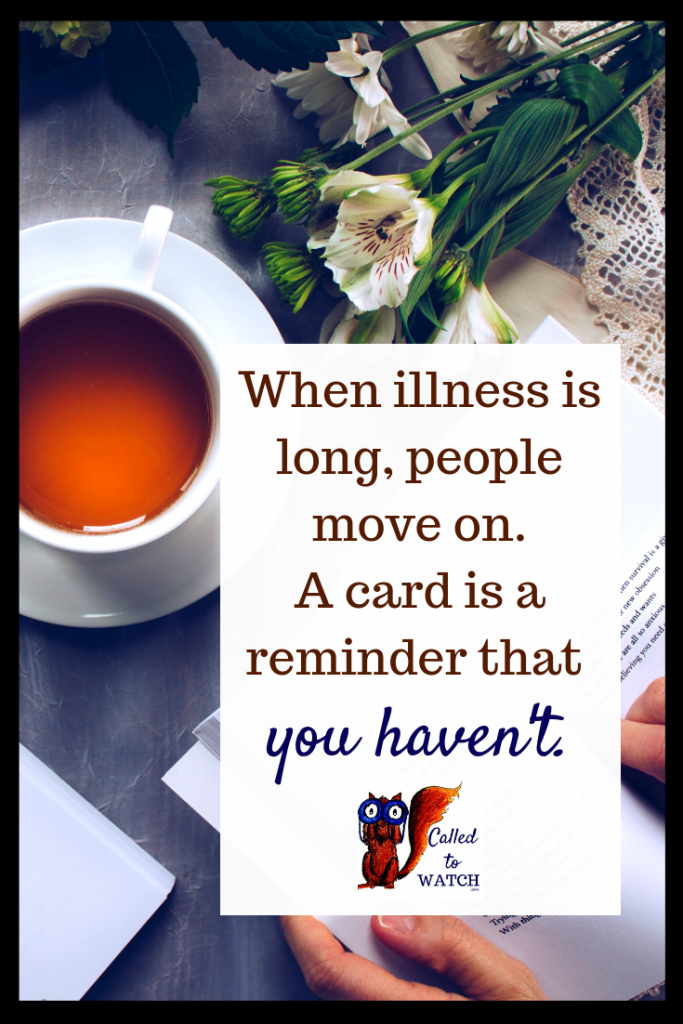If you’ve ever browsed a two-dollar shop (as we call them in Australia), you’ll know there are many types of cards you can purchase.
Happy Birthday; Congratulations on your baby/engagement/anniversary; My Sympathy; and Get Well Soon cards. This last category can be somewhat disconcerting in the context of a chronic illness.
Of course, the easy solution is to buy your card without those words printed on the front.
But the problem goes deeper than that – what do you write in a card for someone who’s not going to get better? Should you send a card at all? How often? What’s the point?
Why you should write a card to someone who’s chronically ill
1: A card is a physical reminder of love
A card is a gift that keeps on giving. You can hug someone and they are left with good memories. When you give someone a card, they are left with good memories + a physical reminder of your love and concern.
When illness goes on and on, having concrete proof that you have not been forgotten is worth its weight in gold.
2: You can never receive too many cards
It’s easy to think ‘they’ve been ill for so long, they must have heaps of cards’. Yet it doesn’t work that way. You never ‘get over’ receiving reminders of love.
When illness stretches over a very long period, the ‘card-giving’ tapers off. People move on. A card is a reminder that you haven’t.
3: You don’t have to be rich or talented to write a card
It can be hard to know how to love someone, especially if they are often too unwell to visit or participate in social events. Words are a simple way to love. It does not take ‘too’ long or ‘too’ much energy to write and send a card.
You may not be able to do anything else, but you can write a card.
You may not have the words or the courage to share something personal in conversation but you can write it in a card.
You may find all your encouragement disappearing when you meet face to face, but you can think it out and prepare it beforehand in a card.

How to write a card to someone who’s chronically ill
Sometimes it’s hard enough to fill up that glaring white space inside a Happy Birthday card – so the thought of writing to someone who is chronically ill can seem terrifying.
Here are some tips:
1: Write as you talk
Relax, no one’s expecting you to be Milton or Shakespeare. In fact, there’s a time and a place for those ‘famous’ writers, and a card to a chronically ill friend probably isn’t one of them.
Be yourself. You don’t need to sound formal. You don’t need to have proper sentence structure and you don’t even have to write a lot.
Don’t be afraid to ‘waffle on’ or to make jokes. This isn’t an English exam. No one’s judging you.
If it helps, think of the card as merely ‘part’ of an ongoing conversation. It doesn’t have to be complete in itself, and it doesn’t have to be the last card you’ll ever send or even the first of many.
2: Use someone else’s words
If you don’t know what to say or if you feel like you compulsively need to fill all the white space because you bought a really big card – copy from someone else.
It could be a quote from a book you’ve read, a newspaper clipping of a funny story, a meme you found on the internet, song lyrics or a bible verse.
It doesn’t matter. It’s not cheating.*
*= as long as you reference the real author. ie. DON’T try and pass one of Shakespeare’s sonnets off as ‘this is a poem I wrote the other day’… trust me, it won’t work.
3: Tell a story
Often we feel as though a card has to be a direct message from us to the receiver. That’s not true. A card can be anything you want it to be. It can be a recount of your day, or the funny conversation you overheard, of what you learnt recently about jellyfish or Hebrews 4.
If the thought of writing to someone is scary, think of a card as a ‘diversion’ for them. You’re not claiming to have words of wisdom to share, you’re simply helping them pass their day.
The very act of writing is a reminder that you care – it doesn’t so much matter what you write.
4: Write a prayer
If you pray for your chronically ill friend, sending them a card can be as simple as writing down the prayer you prayed that morning. For example:
“Hi! Was thinking about you this morning and I prayed that Jesus would give you strength today and give you peace as you …etc.”
It doesn’t have to be long or elaborate.

A few last reminders as you sit down to write that card…
Receiving a card can make someone’s day. It also, may not. That’s okay.
Don’t expect the receiver to reply straight away/at all/effusively. Remember why you are writing: to love them, not to receive thanks.
Some of the kindest messages I have received have included a single line down the bottom, such as: please don’t feel the need to reply to this – use your energy in other ways!
//who will you write a card to today?
PS: Enjoyed the post above? Get the next one delivered straight to you! Sign up for email notifications
I’m also on Facebook, Pinterest, Instagram & Twitter! Meet me there for more interesting reads, resources and community.


This was a beautiful post – thank you for your inspiring words, and reminding me about being positive during difficult times.
Thank you so much Rochelle. So thankful these words blessed you.
Hi Emily, sorry for taking so long to notice this beautiful post. I love the gentleness of your soul portrayed through your words. Thank you for this reminder about writing cards. I think it is something that doesn’t happen enough these days (now I’m starting to sound old), but you know it should. Writing cards to those with chronic illness shouldn’t be so difficult (I know it often is), because as you say, there are so many things we can say or write in a card. Just be ourselves ♡